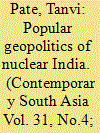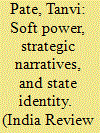| Srl | Item |
| 1 |
ID:
192862


|
|
|
|
|
| Summary/Abstract |
Conventional wisdom on India’s nuclear geopolitics takes a top-down approach, foregrounding state perceptions of India’s nuclear role in regional and global politics. This conventional approach overlooks the bottom-up processes, such as media representations, which have been fundamental in shaping India’s nuclear identity. This is because media representations comprise common-sense knowledge, since media is the primary source of information in a democracy. Building on theoretical underpinnings of popular geopolitics, this article focuses on analyses of media representations in the Editorial of the English daily The Hindu from 2011–2020. This national newspaper boasts the second-largest readership among English dailies. The direct link between The Hindu Editorial’s representations of ‘nuclear India’ and India’s ‘regional’ and ‘global’ selfhood is crucial. The concerned period of 2011–2020 was pivotal in charting Indian geopolitical identity, as India partook in international negotiations after the US-India Nuclear Deal in 2008 and became a member of multilateral export control regimes like the Wassenaar Arrangement, Australia Group, and Missile Technology Control Regime. This article deconstructs the Editorial texts to elicit the intertextual links underpinning the ‘geopolitical cultural signifier’, ‘geospatial mythology’, and ‘self/other’ binary representation that operationalises India’s nuclear identity in regional and global settings.
|
|
|
|
|
|
|
|
|
|
|
|
|
|
|
|
| 2 |
ID:
160689


|
|
|
|
|
| Summary/Abstract |
In 2011, India and Afghanistan signed the Strategic Partnership Agreement that delimited cooperation in economic, social, political, and cultural areas. It depicted the rise of Indian soft power influence. However, the extent to which India garners strategic influence in Afghanistan through soft power remains contentious. This article contends that India’s soft power effectiveness in Afghanistan post-2011 can be fully grasped only via the construction and reception of India’s regional power identity negotiated at the sites of: “civilization,” “democracy,” and “economic-military” enabling India to provide a regional leadership that can forward both India and Afghanistan’s mutual interests. Examining soft power via the constructivist-discursive framework of collective identity strategic narrative, this article compares India-Afghanistan relations in periods 2011–14 and 2014–17. The former formalized strategic partnership agreement and the latter marked continuation of the agreement albeit through domestic political transitions in both countries. This article demonstrates that the Indian soft power influence in Afghanistan between 2014 and 2017 has increased markedly.
|
|
|
|
|
|
|
|
|
|
|
|
|
|
|
|